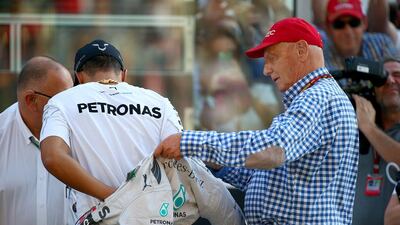It was appropriate that as Lewis Hamilton got into his race overalls on Sunday in preparation for the Etihad Airways Abu Dhabi Grand Prix, it was Niki Lauda who helped him.
The Austrian, the non-executive chairman of Mercedes-GP, held several conversations with Hamilton in September 2012 as he tried to persuade the Briton to leave McLaren-Mercedes, the only F1 team he had raced for, and take a risk by joining the German marque, who at that stage had won only once since their return to the sport in 2010.
Lauda, the three-time world champion, proved persuasive as Hamilton abandoned a proven winning team, with whom he had won the 2008 drivers’ title, and signed a three-year deal with Mercedes.
After clinching his second world title in victorious fashion by winning in Abu Dhabi on Sunday, Hamilton said that the move had been questioned heavily at the time and “a lot of people said it was the wrong choice”.
It has proven to be not only the right choice, but an inspired one, as Hamilton has achieved the second world title he had so desperately cherished.
Last season mustered only one win for him, but Hamilton’s move was always with an eye to 2014.
Mercedes power units have consistently been the most powerful on the grid in the modern era of F1 and the move to 1.6-litre V6 turbos this year was always going to make the marque a contender, as long as the car was at least reasonably competitive aerodynamically.
The W105 chassis has more than surpassed expectations and Hamilton, for the first time since 2008, had consistently the fastest car on the grid at his disposal.
Getting himself into the best car was one thing, making full use of it is another, but Hamilton did it.
Eleven victories in 19 races sums up the best season, results wise, of his career.
Nico Rosberg has proven a worthy opponent in the same machinery and a minor consolation for the German is becoming the first teammate of Hamilton’s in F1 to outperform him in qualifying over a season with 12 pole positions to the Briton’s seven.
Rosberg was quick, but Hamilton always appeared to have an answer when he needed one.
Beating Rosberg when the German was quicker in Bahrain and Spain, holding him on the final lap in Hungary on old tyres, passing him in the wet in Japan were all key moments during the past eight months of racing across the globe.
Sunday provided another example of Hamilton stepping up when he needed to.
Rosberg was on pole and had the ability to make Hamilton’s life difficult in the race by controlling his pace and being tactical to keep him in sight of other cars.
But Hamilton removed that prospect with a storming start to take the lead and controlled the race from there on.
It was disappointing Rosberg’s race was hurt by mechanical problems, but Hamilton had already proven he again had his teammate covered as he held the track advantage over him.
Hamilton did what he needed to when he had to and that is what makes a champion.
The Briton has had to endure the Sebastian Vettel-Red Bull Racing era of dominance, but now he is in a position to create his own period of success.
He will start as a strong favourite next March when the new season begins in Australia to become a triple world champion. With the engine regulations almost certain to remain the same for 2015, there is no reason why Mercedes should not continue to be the pacesetters, given they have consistently had a speed advantage of at least half-a-second a lap over their rivals this year.
If that is the case, then we are looking at Hamilton v Rosberg II, and Hamilton will fancy that scenario greatly, having proven this year he can out-race his teammate.
His qualifying form could do with improving, but as Hamilton wakes up on Monday in Abu Dhabi and reflects on what he has achieved, he will know this has the potential to be the start of continued success.
gcaygill@thenational.ae
Follow our sports coverage on Twitter @SprtNationalUAE

